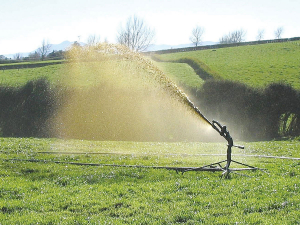Waikato dairy effluent breaches lead to $108,000 in fines
Two farmers and two farming companies were recently convicted and fined a total of $108,000 for environmental offending.
 Spreading effluent solids requires specialist machinery suited to the type of effluent being spread.
Spreading effluent solids requires specialist machinery suited to the type of effluent being spread.
Good effluent management combines a well-designed effluent system with processes for collecting effluent and applying it to pasture in the right quantities at the right time.
Onfarm benefits of good management include:
- Fertiliser savings
- Improved soil condition
- Prevention of animal health issues
- Compliance with council rules or resource consent.
The key to good decisionmaking is understanding the soil water deficit as essential to prevent ponding and run-off and to avoid applying effluent to saturated soils.
Soil water deficit is the amount of effluent which can be applied to the soil before it reaches field capacity (the amount of water held in the soil after excess water has drained away). If effluent is added at field capacity it will likely result in ponding, runoff or leaching.
The average dairy cow produces about $25 worth of nutrients annually as farm dairy effluent (FDE), according to DairyNZ.
For a 400 cow dairy herd this represents about $10,000 of nutrients annually. Using these FDE nutrients effectively will greatly reduce the fertiliser bill.
Spreading effluent solids requires specialist machinery suited to the type of effluent being spread.
Using a local contractor to spread the effluent solids may be an option. Alternatively, you can hire or buy machinery to do it yourself. Vehicle spreading provides the flexibility to apply effluent in areas where the effluent irrigation system cannot reach. It can also be used for a nutrient boost prior to sowing a crop or applied on silage and hay paddocks.
Legal controls on the movement of fruits and vegetables are now in place in Auckland’s Mt Roskill suburb, says Biosecurity New Zealand Commissioner North Mike Inglis.
Arable growers worried that some weeds in their crops may have developed herbicide resistance can now get the suspected plants tested for free.
Fruit growers and exporters are worried following the discovery of a male Queensland fruit fly in Auckland this week.
Dairy prices have jumped in the overnight Global Dairy Trade (GDT) auction, breaking a five-month negative streak.
Alliance Group chief executive Willie Wiese is leaving the company after three years in the role.
A booklet produced in 2025 by the Rotoiti 15 trust, Department of Conservation and Scion – now part of the Bioeconomy Science Institute – aims to help people identify insect pests and diseases.